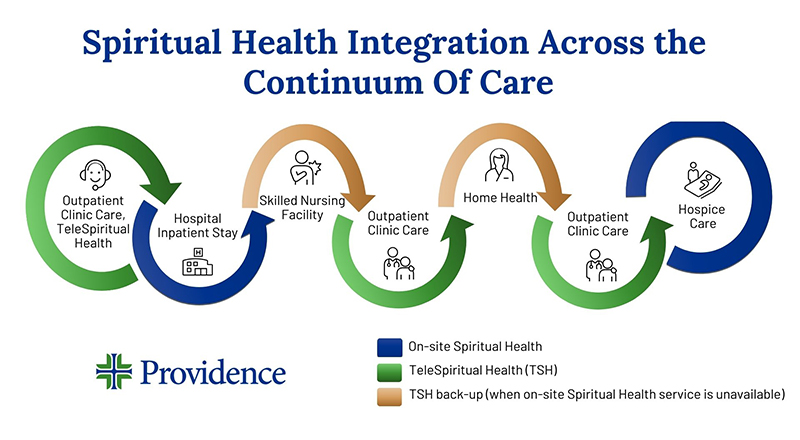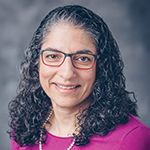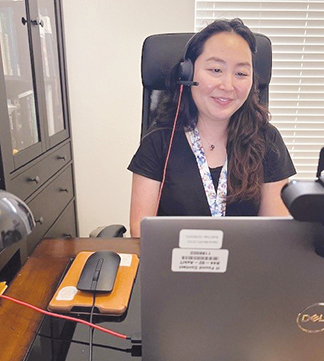
To help staff deal with the spiritual toll of the COVID-19 pandemic, Providence St. Joseph Health in 2022 began offering its workers virtual access to spiritual care through the TeleSpiritual Health program.
The service was so well received that Providence now is expanding the offering to a select group of patients and their families.
To date, more than 1,000 Providence employees and patients have used the service, and the system is looking at how best to expand access to and awareness of it.

"We are committed to the care of our caregivers' mind, body and spirit, and we want to be innovative (in how we do that)," says Theresa Vithayathil Edmonson, Providence vice president of spiritual health. "We are responding to the signs of the times and to the needs" of employees and patients.
More burnout
According to a November 2023 report from the Centers for Disease Control and Prevention, from 2018 to 2022, health workers reported an increase of 1.2 days per month of poor mental health. The percentage of workers who reported "very often" feeling burnout increased from 11.6% in 2018 to 19% in 2022.
The report indicates that U.S. health workers experienced a 249% increase in rates of work-related injury and illness between 2019 and 2020, and "the pandemic intensified existing risks and workloads because of staff member shortages, high patient loads, supply shortages, fatigue, and grief, exacerbating preexisting crisis levels of burnout." The report is "Vital Signs: Health Worker — Perceived Working Conditions and Symptoms of Poor Mental Health — Quality of Worklife Survey, United States, 2018–2022."

The report says that during the timeframe, health workers also experienced increased harassment and violence, which put them at heightened risk of depression, anxiety, post-traumatic stress, and suicidal ideation.
Providence saw the same worrying burnout and mental health impacts among its workforce, with those trends worsening after the pandemic's onset. Edmonson says this prompted the system to engage its Well Being Trust foundation in exploring remedies. Providence established that foundation in 2016 to advance "the mental, social, and spiritual health for all," the foundation's website says.
Chaplain support
As part of a broader response to caregiver burnout, the foundation provided Providence's system-level spiritual health team with funding to create a platform to give Providence's approximately 122,000 staff across seven states and several international sites — as well as their family members — virtual access to spiritual care services.
Edmonson's team used the money infusion to develop evidence-based approaches to providing spiritual care over videoconference. The team recruited board-certified chaplains from among Providence's existing chaplain workforce to staff the service at select times. The team then trained those chaplains to provide spiritual care over virtual connections. Currently 25 chaplains from throughout Providence staff the TeleSpiritual Health service as part of their work.
Providence has built awareness of the service among staff, including by sharing questions that can help them determine whether they might benefit from spiritual health services. Employees and their family members interested in speaking to a chaplain use an online form to choose an appointment time. The service is available from 7 a.m. to 7 p.m. PST Tuesday through Thursday. Appointments last 45 minutes. The chaplains take shifts handling appointments.
Brief intervention
Before their appointments, if they wish, caregivers can complete a screening through an online tool. Edmonson says during the subsequent appointments — which can take place over videoconference or phone — chaplains invite the callers to describe why they requested the spiritual health visit. The chaplain then may talk with the caller about ways to pursue those goals and tools for doing so. The chaplain may recommend certain spiritual practices.
Often, chaplains also will provide grief support, prayers and spiritual guidance.
The callers can be of any or no spiritual background. They can use the service as many times as they wish.
Pilot for expansion
According to Providence, these digital offerings "have received overwhelmingly positive feedback including consistent remarks of feeling heard, supported and grateful for the chaplain's time and insightful guidance, as well as the opportunity to engage in meaningful conversations with the chaplain."
Edmonson says this success convinced Providence and Well Being Trust to expand the service to patients, and the foundation provided another infusion of funds to do so.
Rev. Charlie Shin is a Providence system-level chaplain who helped to develop the TeleSpiritual Health platform for patients, and she is the sole chaplain staffing that virtual service while it is in its pilot phase. The first group receiving access is cardiology patients being treated on an outpatient basis. This group was selected for virtual spiritual services since research showed that cardiology patients have a high level of spiritual need, and since chaplains are not physically present in most Providence outpatient sites.
Providence has put a brief screening tool in the electronic medical record that clinicians in its outpatient cardiology sites can use to determine which patients may most benefit from spiritual care services. Those patients receive information on how to sign up online for the TeleSpiritual Health appointments with Shin.
Providence is monitoring how well the employee and patient services are working, using both quantitative and qualitative measures, and that information will guide its future expansion. Edmonson says "the word is out" about the service, and additional Providence departments are clamoring to be able to extend the offering to their patients.
Already, leaders decided the service will expand to behavioral health patients at Providence Oregon sites soon.
Deep connections
Edmonson and Shin say there are many practical reasons a virtual platform can make sense for delivering spiritual care. It can save travel time and expense and be more convenient for the employees, patients and chaplains. It also can reduce exposure to infectious diseases that can be encountered in the hospital environment. And both the chaplain and the caller to be in a space where they are comfortable, dialing in remotely.
It also can provide chaplain coverage in areas where it is difficult to provide an in-person chaplain presence.
Beyond these practical advantages are additional benefits. Chaplains who staff the appointments have been able to provide the same type of meaningful care over virtual connections that they do in-person. Callers have been open in delving into emotional topics with them. The chaplains have been able to establish deep connections with these staff and patients.
Edmonson says it's been surprising to learn that many callers are getting in touch not necessarily because they are in acute spiritual crisis, but instead because they are seeking spiritual growth.
Shin mentions that there have been collateral benefits to TeleSpiritual Health. The process of making employees aware that the services are available and the employees' use of the services have led to greater understanding around Providence of what chaplains are and how their services can benefit people. This has led to more workers letting patients know about the in-person chaplain services available to them.
Edmonson says the expansion of access to spiritual care services is well aligned with Providence's "wellness approach — we're proactively tending to the spirit. This is a great embodiment of what it means to live out our mission to provide whole-person care."
